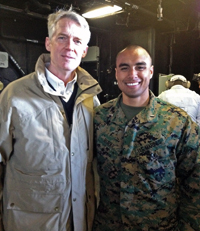Strengthening the Civilian-Military Link: USIP and Navy-Marine Corps Coordination
The role of the Navy and Marine Corps is critical to the growing importance of the Asia Pacific region in national security strategy. Recently, conflict management and peacebuilding experts from the U.S. Institute of Peace participated in the Navy’s biggest amphibious exercise in a decade, Bold Alligator, as part of USIP’s expansion of civilian-military cooperation and training.

Responding to today’s conflicts and humanitarian crises takes planning and skills that are beyond the capacity of any single organization. Military and civilian personnel must have the ability to design and implement operations across institutional and national boundaries and be able to work together in rapidly changing, insecure environments.
The role of the Navy and Marine Corps is critical to the growing importance of the Asia Pacific region in national security strategy. Recently, conflict management and peacebuilding experts from the U.S. Institute of Peace participated in the Navy’s biggest amphibious exercise in a decade, Bold Alligator, as part of USIP’s expansion of civilian-military cooperation and training.
The exercise off North Carolina and Virginia in early February showed how the capabilities of the Marine Expeditionary Brigade and the Navy’s Expeditionary Strike Force are integrated. Experts inside and outside the military say that such exercises emphasize the need for strong cooperation between military and civilian agencies in humanitarian and disaster relief operations.
USIP’s long-standing Working Group on Civilian-Military Relations in Non-Permissive Environments strengthens cooperation among the range of military, government civilian and NGO actors for these kinds of operations.

USIP Chief of Staff Col. Paul Hughes, a retired Army colonel, led a USIP team that observed the exercise. Senior trainer Nadia Gerspacher, who works extensively with the military, runs the USIP component of the Defense Department’s Ministry of Defense Advisers (MODA) program, which joins American institutional experts with counterparts in Afghanistan’s ministries to help them become better partners. USIP’s participation in the exercise at the Navy’s request underscored peacebuilding’s support of national security, particularly through civ-mil relations and training.
“The Marines invited USIP to participate in Bold Alligator to observe first-hand the Navy and Marine Corps planning process,” Hughes said. “With the increasing concern about the Asia-Pacific region, the Navy and Marines will be very active in the region dealing with ambiguous and complex situations that result from natural disasters or conflict. They will look to USIP for its great deal of expertise based on its long experience in the region, including its peace operations in the Philippines during the Moro Islamic Liberation Army insurgency in the early 1990s.”
USIP is already at work in the Asia Pacific region, especially Northeast Asia. The Institute leads the Track 1.5 dialogue on the Korean peninsula, supports the U.S.-China strategic relationship, and is co-sponsoring nuclear dialogue between India and Pakistan. Emerging engagement with Burma includes the roles of rule of law and religion in preventing conflict. USIP has also worked in Nepal, Sri Lanka, and Japan. In 2012, USIP also expanded its presence in Islamabad.
USIP’s mission, from strengthening the rule of law to creating new dialogues between various parties, has paid off in a number of ways. In Nepal, for instance, the country was confronting rising violence in 2009. The Nepali national police asked for USIP’s help in establishing a dialogue to build trust between police and civil society.
Sometimes that trust just comes down to talking. The Institute responded by implementing Justice and Security Dialogues—essentially a series of “facilitated conversations” between police officers, members of civil society and government officials—that directly resulted in a dramatic decrease of crime and violence. And it had impact.
According to a senior Nepalese police official, the police reported in December 2010 that due to the USIP intervention between youth groups and the police, relations and cooperation had improved considerably. During the 18 months preceding the dialogues, there were 278 kidnappings and 13 fatalities. In the 18-month period following the series of dialogues, the police said, there were 67 kidnappings and one fatality—overall a 77 percent improvement.
More specifically in Asia and the Pacific region, USIP hosts a number of initiatives that bring together members of the political and policymaking communities to discuss vital security and economic issues in the region. These include the U.S.–China Project on Crisis Avoidance, a Trilateral Dialogue on Northeast Asia, and the Korean Working Group.
As the Asia Pacific strategic environment develops, USIP will continue its work to help prevent destabilization of the region and to strengthen civilian-military relations and integrated training.
“When Navy and Marine personnel deploy ashore in crises with medical and disaster supplies,” Hughes said, “the degree to which the military and NGOs and civilians are coordinated and collaborate translates into lives saved and mission effectiveness. USIP’s observer participation in Bold Alligator helped strengthen the dialogue with the services and increased understanding of the need for partner capacity in peace and security operations.”



